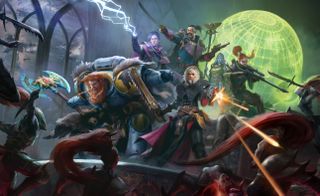Shaki
Arbiter
Mastering new character systems is the best part of these games, what the fuck is frustrating about it? If you're in it for bear buggery you can use journo/normal difficulty, follow recommended talents and dont worry about anything, otherwise having deep and complicated systems is pure goodness.https://www.pcgamer.com/most-rpgs-are-getting-character-creation-wrong/
Most RPGs are getting character creation wrong
By Fraser Brown
published 34 minutes ago
Making a new character shouldn't feel like taking an exam that you can fail.

(Image credit: Owlcat Games)
Despite occasionally indulging in the popular videogame critic pastime of making wild predictions, I am not, I must confess, a soothsayer. As hard as I have tried, I am entirely incapable of peering into the future. This is unfortunate for many reasons, but for the purposes of this article the one I am going to focus on is how it makes character creation in most RPGs a bit of a pain in the arse.
Broadly, I love making RPG characters, whether it's yet another alt in an MMO or a new hero (or more likely a villain) in a chunky singleplayer RPG. I will often spend an inordinate amount of time fleshing them out, poring over starting traits, potential backstories and ability scores. According to Larian, players have spent a combined 8,196 years in the Baldur's Gate 3 character creator, and I am not remotely surprised.

(Image credit: Larian Studios)
My problem with character creation isn't that it often takes a long time, it's that too many RPGs expect you to be able to predict how these choices you make will affect your playthrough. Sure, you're probably going to know what picking a Fighter means, but when it comes to picking more granular things, how can you possibly know you're making the right choice if you've never played the game before?
I mentioned Baldur's Gate 3 above, but I should add that my experience of character creation in Larian's RPG was pleasantly smooth. You don't need to make too many choices, and I've played enough D&D and RPGs based on D&D to know what I'm getting into. Having played all of Larian's previous games, I could also be confident that I'd get plenty of opportunities to see my choices reflected in the game. Making a deceitful, charismatic Bard, I knew that I'd be able to trick people and talk my way out of lots of fights, because that's the kind of games Larian makes.
Developers cannot expect this kind of foreknowledge, however, and even Baldur's Gate 3 features some character creation choices where the outcomes are hard to predict. Take the Dark Urge origin, for instance. Playing as a Dark Urge character means giving up some of your agency. Fantasising about ripping off a hand leads you to actually ripping off said hand, ensuring that you'll never be able to recruit the Wizard Gale. The Dark Urge narrative is brilliant, but it's easy to imagine some players being turned off by this. Without doing their homework they wouldn't know to avoid this origin.
Maths homework

(Image credit: Owlcat Games)
Rogue Trader is the specific RPG that inspired me to write this. Owlcat RPGs always feature complex, elaborate character creation systems, and while that's a plus for a lot of players, Rogue Trader just expects too much from newbies. Selecting abilities brings up tooltips that contain more maths than I've seen since I left school, full of sums and formulas that will make absolutely no sense unless you've done some extra legwork.
As Jody explains in his Rogue Trader review, it's a bit ridiculous. "You'll be staring at options like adding +(50 + 10 x Ballistic Skill bonus) / number of enemies in the area of effect)% damage with an additional +(10 + 2 x Ballistic Skill bonus)% dodge reduction to your next ranged area-of-effect attack, and wondering who thought making it all so bitty was a good idea." It's not that even that the mechanics are too complicated—the problem is that no effort has been made to make these important choices remotely legible. How can a new player, who has perhaps never played an Owlcat RPG before, or is maybe even new to complex CRPGs of this breed entirely, be expected to parse all of this before they've even spent a second playing the actual game?
A lot of RPGs these days also get you to select backgrounds for your characters that are independent of their classes, which can confer mechanical bonuses but also lots of flavour. In Rogue Trader, it makes you do this twice. You've got your origin, and then how you spent your years before the game. I tried to make a character that felt cohesive, so I created a fella who was born in space (void born), became a naval officer, and then selected the buff-heavy Officer archetype (what Rogue Trader calls its classes). The bonuses to being void born weren't very appealing, but from a narrative perspective it made sense for my character. Unfortunately, this never actually comes up in the game at all.

(Image credit: Owlcat)
Talking to other void born characters, it's as if I'm completely clueless about what being void born means. And when I talk to the many bigots of the Imperium who don't trust the void born, they never acknowledge that I'm one of them, nor am I given the ability to defend my kind. If I'd known Rogue Trader was the type of RPG that didn't really refer back to these kinds of choices, I wouldn't have picked what I did—but that's not something I could have possibly known before I'd even started playing.
Rogue Trader is an egregious example, but the issues that its character creator surfaces are pretty common. For instance, my very first companion shared some of my abilities, and while this can sometimes be helpful, in this instance the abilities in question weren't really things I wanted to double up on. But I've taken this companion everywhere anyway, because so far he's proved to be my best tank. Once again, if I'd known this before making my character, I would have probably made other choices. This happens all the time in RPGs, and I often find myself starting again when I realise that a companion I want to keep around shares far too much with my player character.Rogue Trader is an egregious example, but the issues that its character creator surfaces are pretty common.
In fairness, quite a lot of RPGs have tried to find a way around the above problem, and some of the others, by letting you respec your character. Sometimes you can even respec your companions. So, if you've made a Wizard in Baldur's Gate 3 but still want Gale to stay in your party, you can respec him into another class so that you're not doubling up. This, however, often comes at a cost, or includes some limitations. I've yet to encounter this option in Rogue Trader, but it exists in Owlcat's previous RPGs, which is great—except that you need to spend gold for each respec. The same is true of Baldur's Gate 3. Why? What is the purpose in making you burn in-game cash just to experiment or rectify mistakes?
One of the most annoying types of restrictions crops up in Cyberpunk 2077, where you can respec your perks as many times as you want, for free, but can only respec your attributes once. Again, what purpose does this limitation serve except for punishing players for not knowing exactly what kind of character they want to build?
The spectre of D&D

(Image credit: Larian Studios)
Many of these issues stem from western RPGs frequently using D&D as a template, but what makes sense around the table doesn't always translate as well to a videogame. I'm currently playing a Star Wars TTRPG campaign with some of my colleagues, using the fairly breezy Black Star RPG rules. Having not played Black Star, however, I had a lot of questions during character creation as I tried to figure out what was viable. For instance, I wanted to make a pilot, but wasn't sure how useful their skills would be, or if we'd be using vehicles much. If this was a videogame, I'd just have to wing it and hope for the best, but since this is a TTRPG campaign I was simply able to ask Robin, our GM.
TTRPGs also benefit from the fact that the GM can tailor the campaign around your choices, making sure you all have opportunities to use your skills and see your choices reflected in the gameplay. Sandbox RPGs with heavy sim elements like Baldur's Gate 3 can sort of replicate this by just being incredibly flexible, but most RPGs are a lot more constrained.

(Image credit: Bethesda)
Bethesda offers my favourite solution in The Elder Scrolls, where character creation is an ongoing process. Aside from picking a race and customising your appearance, everything else happens as you play. My first Skyrim playthrough (of approximately 1,000) saw me initially consider an axe-wielding warrior, but I ended up finding the magic system a lot more engaging than whacking things in melee, which was reflected in my magic skills increasing, allowing me to spend perk points on making myself an even more powerful sorcerer. Skyrim, like the other games in the series, lets you actually experience the game before making these decisions, and you end up levelling up the skills you use the most.
Now, I'm not suggesting that every RPG should ape Skyrim's progression system. The philosophy behind developing your character, though? Yeah, I'd absolutely like to see that more. Any kind of way to make sure you're not immediately leaping into character creation without any kind of foreknowledge would be an improvement. Something that lets you get a taste of the game and how its systems work before you commit. A prologue, perhaps, where you develop your character and get to make considered choices.
The D&D-style character creation system has been too ingrained for too long, however, so I suspect we'll see it continue for a long-ass time. If we can get a few more RPGs that eschew it, though, I'll be happy.
He is right of course, it's a fundamental flaw in the design of most RPG and Tactical games that unless you have the progression tree exposed (which many games still refuse to do in any sensible way that's easy to parse), you won't, as a newbie, know what's a good pick until you've gotten a better sense of the game - which usually "spoils" the initial character you lovingly created and got into while the game felt fresh and new and everything seemed precious.
Well, I say that, but of course as an experienced player of these games, I usually do have a sense of the conventions and the "usual" - especially if it's D&D or a system similar to D&D. But for the newer influx of people who are discovering RPGs and are in it for the gameplay and not the bear fucking, it's bound to be a frustration.
It also doesn't make sense from an rp perspective - as a putative specialist in something, you'd have a good idea of possible lines of development.
The whole problem is the fact that journos and zoomers, want to FEEL like they mastered the system and accomplished something, without actually putting in the effort. They want a "hard" difficulty option like in BG3, where you solve character building by picking haste or any push ability to throw enemies into pits, and you feel like a tactical genius even tho you have 80IQ.























